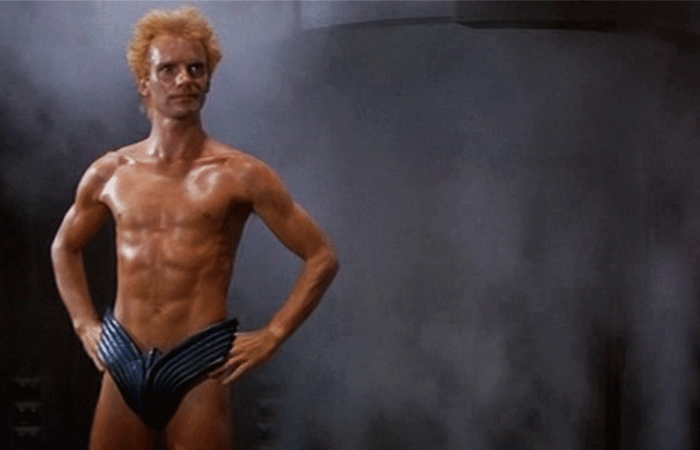Dune at 50: Saucy Taboos and Mundane Evolutions
 One of the elements that makes Dune so gripping is its familiarity. Frank Herbert went to great lengths to accurately portray cultural evolution across vast expanses of space and time. The books may take place halfway across the galaxy 20,000 years from now, but if a Fremen walked by on the street and said “Bless the Maker and all His Water,” you’d probably just nod and think “Right on, man. Right on.”
One of the elements that makes Dune so gripping is its familiarity. Frank Herbert went to great lengths to accurately portray cultural evolution across vast expanses of space and time. The books may take place halfway across the galaxy 20,000 years from now, but if a Fremen walked by on the street and said “Bless the Maker and all His Water,” you’d probably just nod and think “Right on, man. Right on.”
From that point of human universality, we get to compare the people of Dune to ourselves to see what’s different and what’s the same. More importantly, we get to measure the distance between the two, and gauge what kind of pressure it takes to produce or resist cultural change on both grand and personal scales. It doesn’t take long for a shocking taboo to turn into something commonplace. Just try wearing your 2015 bikini to the beach in 1930!
Sisterhood of Dune (Schools of Dune Series #1)
Sisterhood of Dune (Schools of Dune Series #1)
By Brian Herbert , Kevin J. Anderson
Hardcover
$25.19
$27.99
Breeding program
One of the book’s central struggles involves the complex breeding program operated by the Bene Gesserit. Their goal is to create a sort of super human by cherrypicking genetic traits across thousands of generations. Since artificial gene manipulation is a major taboo, the secretive group goes about it the old fashioned way: locking a man and a woman in the bedroom with scented candles and a Barry White album.
People outside of the Bene Gesserit don’t pay much attention to the breeding program. It’s just another weird thing those witches do, like drinking spice essence or reciting the litany against fear. Artificial selection doesn’t even sound that terrible to our modern ears. After all, we’ve been pairing dogs with other dogs for centuries to get fluffier, cuter puppies. What’s one more step to do the same with humans?
Oh, wait, no, that sounds terrible. Forcing people to have babies to design a super human? It recalls words like “eugenics,” and twisted programs developed by the Nazis. The reality of a human breeding program knocks us down to the level of animals, and that’s not something we’re comfortable with on a personal or societal level. Paul’s mother Jessica felt the same way, which is why she defied the charts and had a son instead of a daughter, kicking off the entire Dune series. Oopsie.
Breeding program
One of the book’s central struggles involves the complex breeding program operated by the Bene Gesserit. Their goal is to create a sort of super human by cherrypicking genetic traits across thousands of generations. Since artificial gene manipulation is a major taboo, the secretive group goes about it the old fashioned way: locking a man and a woman in the bedroom with scented candles and a Barry White album.
People outside of the Bene Gesserit don’t pay much attention to the breeding program. It’s just another weird thing those witches do, like drinking spice essence or reciting the litany against fear. Artificial selection doesn’t even sound that terrible to our modern ears. After all, we’ve been pairing dogs with other dogs for centuries to get fluffier, cuter puppies. What’s one more step to do the same with humans?
Oh, wait, no, that sounds terrible. Forcing people to have babies to design a super human? It recalls words like “eugenics,” and twisted programs developed by the Nazis. The reality of a human breeding program knocks us down to the level of animals, and that’s not something we’re comfortable with on a personal or societal level. Paul’s mother Jessica felt the same way, which is why she defied the charts and had a son instead of a daughter, kicking off the entire Dune series. Oopsie.
Dune Messiah
Dune Messiah
Paperback $8.99
Incest
One of the odd side effects of the Bene Gesserit breeding program is that certain genetic traits need strengthening before expanding to new lines. To that end, Bene Gesserit women sometimes have children with their relatives. There was even a proposition in Dune Messiah that Paul impregnate his own sister! No one, not even the Bene Gesserit, celebrates this quirk of artificial selection, they just shrug and go along with it, certainly more readily than we would. Oh, the sacrifices one makes to create a Kwisatz Haderach.
Drug use
Recreational drugs are frowned upon in Dune, as they often our in our society. Mentats hooked on sapho juice are seen as weak and malleable, and don’t even get me started on semuta abusers. Spice occupies a unique position as an addictive substance pretty much everyone is OK with. Its use can cause crippling side effects, but because the benefits are so tremendous, a strong cultural bias never really formed against it.
Instead of seeing spice like a drug, it’s better to think of it as some sort of super-coffee. We know drinking tons of caffeine isn’t exactly good for us, but coffee is delicious, it makes us feel alert, and the only downsides involve a few extra trips to the bathroom in the morning. Everyone accepts it as a valid type of consumable, so we can drink it in public without anyone casting dirty looks our way. That doesn’t mean it’s harmless, or that a taboo couldn’t eventually form against it, just that, for now, we’re in the clear.
Incest
One of the odd side effects of the Bene Gesserit breeding program is that certain genetic traits need strengthening before expanding to new lines. To that end, Bene Gesserit women sometimes have children with their relatives. There was even a proposition in Dune Messiah that Paul impregnate his own sister! No one, not even the Bene Gesserit, celebrates this quirk of artificial selection, they just shrug and go along with it, certainly more readily than we would. Oh, the sacrifices one makes to create a Kwisatz Haderach.
Drug use
Recreational drugs are frowned upon in Dune, as they often our in our society. Mentats hooked on sapho juice are seen as weak and malleable, and don’t even get me started on semuta abusers. Spice occupies a unique position as an addictive substance pretty much everyone is OK with. Its use can cause crippling side effects, but because the benefits are so tremendous, a strong cultural bias never really formed against it.
Instead of seeing spice like a drug, it’s better to think of it as some sort of super-coffee. We know drinking tons of caffeine isn’t exactly good for us, but coffee is delicious, it makes us feel alert, and the only downsides involve a few extra trips to the bathroom in the morning. Everyone accepts it as a valid type of consumable, so we can drink it in public without anyone casting dirty looks our way. That doesn’t mean it’s harmless, or that a taboo couldn’t eventually form against it, just that, for now, we’re in the clear.
Mentats of Dune (Schools of Dune Series #2)
Mentats of Dune (Schools of Dune Series #2)
By Brian Herbert , Kevin J. Anderson
In Stock Online
Paperback $11.99
Machine prohibition
About half the things in your house would be banned in the Dune universe. Certainly the computer you’re staring at, the iPhone you treasure, and probably even the e-reader you stare at for hours on end (and say goodbye to that precious programmable coffeemaker!). Thanks to a catastrophic 10,000-year-old war against thinking machines, everyone in Dune hates artificial intelligence and anything that remotely resembles it. Own something more complicated than a toaster? Instabanned!
Today, we love technology. We drool over self-driving cars, marvel at the next steps in virtual reality, even dabble in the prospect of creating artificial minds ourselves. If someone tried to ban computers, you can imagine the backlash. Think, then, just how terrible the old war must have been to create such a taboo, one that has persisted for over a hundred centuries.
We’re celebrating the 50th anniversary of Dune throughout 2015. View the complete article series here.
Machine prohibition
About half the things in your house would be banned in the Dune universe. Certainly the computer you’re staring at, the iPhone you treasure, and probably even the e-reader you stare at for hours on end (and say goodbye to that precious programmable coffeemaker!). Thanks to a catastrophic 10,000-year-old war against thinking machines, everyone in Dune hates artificial intelligence and anything that remotely resembles it. Own something more complicated than a toaster? Instabanned!
Today, we love technology. We drool over self-driving cars, marvel at the next steps in virtual reality, even dabble in the prospect of creating artificial minds ourselves. If someone tried to ban computers, you can imagine the backlash. Think, then, just how terrible the old war must have been to create such a taboo, one that has persisted for over a hundred centuries.
We’re celebrating the 50th anniversary of Dune throughout 2015. View the complete article series here.


